#the shibboleth of feanor
Explore tagged Tumblr posts
Text
Dear Feanorians and people who know Quenya:
How do I know which words do the Feanorian "th" and which words are always "s"? ("They're spelled with suule vs with silme" is not an answer: How do I know how they're spelled?)
Do I compare them with Sindarin and if Sindarin has "s", it's always "s"? Like, "estel" is always s, right?
Thank you.
#silm#silmarillion#the silm#the silmarillion#tolkien linguistics#tolkien meta#the shibboleth of feanor#house of feanor#not that I'm going to spell them that way consistently#but sometimes I want to be nice#should I tag people or is it impolite to tag people especially non-mutuals?
38 notes
·
View notes
Note
Wait, so like, does Fingolfin's son Argon exist or not?
The Argon Element
He does! Christopher Tolkien tells us (though regrettably does not show us) that his name first appeared in a genealogical table of the House of Finwë dating to 1959, which Tolkien was still revising in 1968 when he wrote the 'Shibboleth of Fëanor'.* It is in that essay that Argon's story appears, in the "excursus on the names of the descendants of Finwë":
Arakáno was the tallest of the brothers and the most impetuous, but his name was never changed to Sindarin form, for he perished in the first battle of Fingolfin's host with the Orks, the Battle of the Lammoth (but the Sindarin form Argon was often later given as a name by Noldor and Sindar in memory of his valour).
A footnote on this passage reveals more about him. (This is also the only mention in Tolkien's published writings of the Battle of Lammoth.)
When the onset of the Orks caught the host at unawares as they marched southwards and the ranks of the Eldar were giving way, [Argon] sprang forward and hewed a path through the foes, daunted by his stature and the terrible light of his eyes, till he came to the Ork-captain and felled him. Then though he himself was surrounded and slain, the Orks were dismayed, and the Noldor pursued them with slaughter.
But his death at Lammoth was not the only fate Tolkien considered for this short-lived (on multiple levels) character. Christopher Tolkien comments (note 38):
[The third son of Fingolfin, Arakáno (Argon), emerged in the course of the making of the genealogies. A pencilled note on the last of the four tables says that he fell in the fighting at Alqualondë; this was struck out, and my father noted that a preferable story was that he perished in the Ice. It is curious that this third son, of whom there had never before been any mention, entered (as it seems) without a story, and the manner of his death was twice changed before the remarkable appearance here of 'the first battle of Fingolfin's host with the Orks, the Battle of the Lammoth', in which he fell. In the account in the Grey Annals (XI.30) Fingolfin, after the passage of the Helkaraxë, 'marched from the North unopposed through the fastness of the realm of Morgoth, and he passed over Dor-Daedeloth, and his foes hid beneath the earth'; whereas in the present note his host was attacked in Lammoth 'at unawares as they marched southwards'.]
Confusingly, in the same essay Arakáno ('high chieftain') is said to be the mothername given by Indis to Fingolfin. It's not clear if Tolkien intended for Fingolfin and his youngest child to share a name or if he was simply throwing names at the wall to see what would stick.
What are you thoughts on Argon? Did he exist? How do his existence and tragic fate change how you think about the characters closest to him? Any wild Argon headcanons? And most importantly, how do you feel about him being taller than Turgon?
*The 'Shibboleth' is published in The History of Middle-earth Vol. 12: The Peoples of Middle-earth.
43 notes
·
View notes
Text
From the Shibboleth of Feanor: “His shield… could be seen by elvish eyes from a great distance if he stood upon a height”
Limitation: there is not always a readily available height.
Solution: there is always a readily available Elrond.

#Yes yes yes I’m serious about this and everything#Also how crazy is the shibboleth it’s like the bible of this fandom#Do we draw our content exclusively from its craziness#Anywayy#ereinion gil galad#gil galad#elrond#elrond peredhel#silm#the shibboleth of feanor#silmarillion#silm crack#silm art#yep im an artist that’s art right there#Silm shitpost
24 notes
·
View notes
Text
When I casually mentioned the "th vs. s" drama to my friend, who is a member (or main guy, not sure) of his university's Tolkien club and does stuff like conventions, his reaction was: "oO What? But that's from some fanfic, right? Or is it an actual thing?"
I think the th controversy is a part of lore that is very Tumblr (and fanfic) specific. Even normal Tolkienists rarely know it.
in reference to this post:
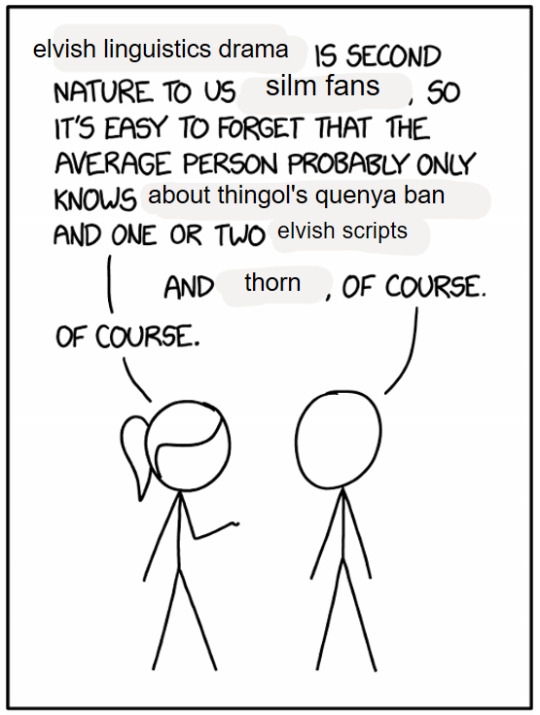
admittedly i'm not the right person to make this meme since i'm not really well-versed in the lore lol
#yes i know that's part of the joke in this comic#but still#it's just way way more niche than quenya ban for example#anyway#silm#reblogs#legendarium tag#the shibboleth of feanor#silm fandom#iconic post
2K notes
·
View notes
Text
Maglor: She sells seashells on the seashore :)
Fëanor: TRAITOR
Maglor, crying: Forgive me! I forgot about--
Fëanor: DO IT AGAIN. DO IT RIGHT.
Maglor, through tears: the thells theathells on the thea thore...
168 notes
·
View notes
Text
"pronouncing 'Þerindë' as 'Serindë' is not that big of a deal" just say you've always been called right your whole life.
#i know it's a repetition but i can't stress it enough#as someone whose name is and has always been: mispronounced/misspelled/butchered/etc.#no. just because you don't like feanor you don't get to call someone else the wrong name. in this specific case it's extremely childish too.#“you're making it too big of a deal” well i'm glad you've never been told “i can't borher to spell your name right - we all know i mean you”#sorry but you (finwë/indis/whoever) can't claim to love/respect someone if you're knowingly and willingly mispronouncing their name.#and i promise this is not about defending anyone other than míriel.#and if you don't get it then good for you ig#i'm genuinely glad you're respected/loved enough for there to be more than literally 5 people calling you the right name#← number not related to míriel but to me#sorry for the rant but i truly hate when stuff like this happens especially when the disrespect is basically weaponized against someone else#probably no one will get it but it's alright. not every thérèse has to belong to you.#btw you can use súle for literally anything else and use thúle for míriel Þerindë specifically. crazy i know.#tolkien#silmarillion#the silmarillion#the silm#tolkien legendarium#míriel#míriel Þerindë#Þerindë#miriel therinde#miriel serinde#miriel#the shibboleth of fëanor#i know i've misspelled fëanor's name in the third tag but fixing it would take literal years off my life. call my hypocrite all you want#feanor#fëanor#fëanáro#feanaro curufinwe#feanaro
65 notes
·
View notes
Text
Silme, sule, orthography and stuff
(@dfwbwfbbwfbwf you wanted me to explain, and it's too much for a comment)
So, the th -> s shift in Quenya. And the question of "which words do have the Feanorian th".
The th is one letter (sule | thule), and there's another letter, silme, and everyone pronounces it as s, even the Feanorians.
To know how would they say "Silmaril", we need to know which tengwa (=letter) does this word use. Thanks to @nerdy-catfish for giving me a link to some etymology. No th variant is mentioned, so it is the silme s.
Also, I realized that I have the edition of the Silm which has Tengwar ornaments on the inner cover and it mentions Silmarils and I checked and yes, it's spelled with silme.
Anyway, I was to talk about Polish orthography and how we had similar situations as the Quenya "th -> s". (English likely had some of those too, but I know Polish better. )
So, for example, long ago we had "ó", which was a different "o". Not longer, I think, but higher in tone? I'm not sure. It slowly changed in sound and became as English "oo". But. We already had a "oo" sound and letter, the letter "u".
So the result is that now, Polish kids have to learn which words with the "oo" sound use "ó" and which use "u".
Why won't we do a revolution and spell all of them with "u"? I don't know.
But, just like in Quenya, it is visible in etymology. It helps to remember many words. For example:
"róg" (horn) <-> "rogi" (horns)
If the "oo" sound changes to o (or a) in some word... (whatever it's called), it's "ó". The "u" never changes. (But, sadly, some "ó" stays as "ó" always too.)
We have similar problems with other sounds, all caused by sounds converging and two letters becoming one sound:
u / ó = oo sound
h / ch = h sound
ż / rz = zh suond
I imagine the poor non-Exilic elven kids must have a hard time with the s-sound too. Oh, wait. Elves have perfect memory. :o
Also, an interesting fact: now it's almost gone, but like a 100 years ago you could very well tell if a Polish person was from the Eastern part of Poland (or rather: of what was Poland before WW2) or well-educated, by how they pronounced "ł". Now we all say it just like English "w" :( but earlier they pronounced it with a touch of "l".
So it's kinda like with Feanorian vs non-Feanorian Noldor. The difference is audible.
BTW, even if we disregard the poiltics, I still have a dillema on sule vs thule.
"Th" makes the orthography non-ambivalent and also fits the Tengwar scheme better - the sound fits better with others in its set.
"S" sounds better in my ears. Maybe because I'm Polish and the "th" sound is not native to me.
#silmarillion#tolkien#silm#tolkien legendarium#the silm#the silmarillion#tolkien linguistics#the shibboleth of feanor#orthography#tengwar#polish language
14 notes
·
View notes
Text
Both are funny, but pronouncing Quenya one way doesn't mean you pronounce Sindarin this way too. (Source: I speak more than one language and can keep the pronounciations separate, and the Elves are supposed to be good at languages)
so I've seen a lot of the "Fëanorian lisping their Sindarin" jokes, but the thing is, Sindarin has the þ sound. They call themselves Thindrim. His name is Thingol.
So I propose a new kind of guy: anti-Fëanorian who sá-sís their Sindarin. Probably a Nolofinwean who crossed the Ice lbr.
"Sose ship-burners will pay! Sey abandoned us just like sat, I cannot believe sey would do sat!"
Galadriel, who changed her dialect to Noldorin Quenya specifically because it was more different than Fëanor's Quenya than her native Telerin was, in Doriath absolutely torn because on the one hand fuck Fëanor but on the other hand she doesn’t want to piss off her host and also her Sinda crush is right there...
It gets funnier the longer it goes on. Some ex-Mithrim soldier living in Rivendell staunchly refusing to ever pronounce the þ despite the fact that Fëanor has been dead half a millennia longer than Elrond has been alive.
#too much sinking#<- prev tag#yes too much burning and sinking#tolkien#silmarillion#tolkien legendarium#quenya#sindarin#the shibboleth of feanor#silm#the silmarillion#the silm
87 notes
·
View notes
Note
Is it a canon for fanon idea that Elros and Elrond are identical twins?
Based on the research I did for this post on who was born first, I found no evidence to confirm or deny that Tolkien imagined them as identical.
Elladan and Elrohir seem to have been ("so much alike were they, the sons of Elrond, that few could tell them apart," from The Lord of the Rings) and Amrod and Amras also ("alike in mood and face" from the Silmarillion and "much alike and remained so while they lived" in The Shibboleth of Feanor). It's not clear whether Eluréd and Elurín were conceived as identical; in several texts they are not even twins.
32 notes
·
View notes
Text
Guys, I was going over some Tolkien grammar just now and something bugged me, why the word "moon" in Quenya is with "S" but in Sindarin it is with "TH" which is basically like it was written in Feanorian Quenya (just replacing the th with þ), Is there a reason for this linguistic regression or is it just Sindarin's weirdness? Do any of you know?
Just a thought
Moon
Iþil = Feanorian Quenya
Isil = Quenya
Ithil = sindarin
#tolkien legendarium#tolkien#shibboleth of feanor#quenya#sindarin#feanorians#curiosity#silm tag#silm#silmarillion
23 notes
·
View notes
Text
Right let’s settle this.
98 notes
·
View notes
Text
There's two different lines in HoME I found about what happened to Indis:
"'But above all her heart now yearns for the halls of Ingwë and the peace of the Vanyar, far from the strife of the Noldor. Little comfort should I bring her, if I returned; and the lordship of the Noldor hath passed to my sons.'" (MR p.249)
This is actually the rest of the quote in my original post, directly succeeding it. So this is Finwë's belief about Indis, which may or may not actually be true, since they've been parted for some time, but is likely not entirely false. It's slightly contradicted by this line in the Shibboleth tho:
"[Findis] did not go into exile, but went with her mother after the slaying of Finwë and they abode among the Vanyar in grief until such time as it seemed good to Manwë to restore Finwë to life. (note 27: If he ever did so. Little has been ever heard in Middle-Earth of Aman after the departure of the Ñoldor)" (PoME p.343&359)
The Shibboleth was written later on, and this isn't a quote from a character, but is Tolkien himself writing, so it probably has a little more merit. But in the LaCE/Statute version in MR, which is afaik the only place where Finwë's fate is documented, he doesn't ever come back to life, instead deciding to stay in Mandos forever so that Míriel can return to life. If this remains true in the later Shibboleth version, then Indis and Findis would probably stay with Ingwë and the Vanyar for forever.
Considering that Tolkien himself says that little is known of what actually happened in Aman after the Flight, though, honestly it's hard to say. The texts agree that she went back to the Vanyar after (possibly before) Finwë's death, but it's quite possible that she returned to visit or abide in Tirion at some point. I find it hard to believe that she would never go to visit Finarfin, or especially Fingolfin if/when he's reimbodied, but I kinda like the idea that her permanent residence became Ingwë's halls again.
Please read this Morgoth's Ring quote with me cuz this is PEAK Fëanor and Fingolfin angst potential: [[This is Finwë talking to the Valar about Indis]] "But Indis parted from me without death. I had not seen her for many years, and when the Marrer smote me I was alone. She hath dear children to comfort her, and her love, I deem, is now most for Ingoldo. His father she may miss; but not the father of Fëanáro!"
Those familiar with only the Shibboleth's list of quenya names might assume that this is referencing Finarfin, but no. At this point in the story, Ingoldo was Fingolfin's mother-name. This quote implies that, according to Finwë's observations, Fingolfin was Indis's favorite child.
SO IMAGINE; Fëanor, who loves his mother so dearly and so desperately, but never knew her, and therefore never felt her love in return, looking at Fingolfin, who gets the favoritism and motherly love that he craves yet never got. Imagine how jealous and furious that might make him, especially since he hates Indis so much. I can't help but wonder if Fingolfin's being his mother's pride and joy was one of the reasons why Fëanor seemed to hate him the most of his half-siblings.
#tolkien#the silmarillion#morgoth's ring#the shibboleth of feanor#indis#finarfin#finwe#fingolfin#house of finwe#ingwe#tolkien meta
366 notes
·
View notes
Text
Fandom: Ony feanorians use thorn, no other elves would ever use it.
Jirt: Actually, many of them would. Galadriel is just a petty bitch
#Galadriel is petty and w love her for that#(I know that ‘fandom’ is a generalization in here it’s just what I personally see most often in fanfic#Sindarin has retained the th sound nobody can taunt Thranduil with it)#shibboleth of Feanor#silmarillion#tolkien#Galadriel#my post
29 notes
·
View notes
Text
Continuing my tradition of Possibly Hot Takes, I don't care that they removed the quenya names from the LotR character tags, it's a mild annoyance at best and sending complaints to ao3 about it is silly
There are much larger things to complain to ao3 about, like the volunteer who got censured for having from the river to the sea in their slack profile
8 notes
·
View notes
Text
I agree, it's epic!
Also, my Feanorian friends ( @dfwbwfbbwfbwf & others), you may want to massively go to the comments section and tell the author of the video about the lisp th, because he quite clearly says "si" at one point. :) (pls do not kinslay him)
(but seriously go and comment, because it would be awesome to have this video even more faithful to the Legendarium and I'm sure the author would appreciate the info)
youtube
This might be one of the most epic things I've ever heard. Do yourself a favor and listen to this brilliant performance of the Oath of Feanor in Quenya. You will not make it through without chills, I promise.
#silmarillion#silmarillion fan video#feanor#oath of feanor#not my video#quenya#tolkien#Youtube#reblogs#ai art#the shibboleth of feanor#silm#silm video#tolkien legendarium
65 notes
·
View notes
Text


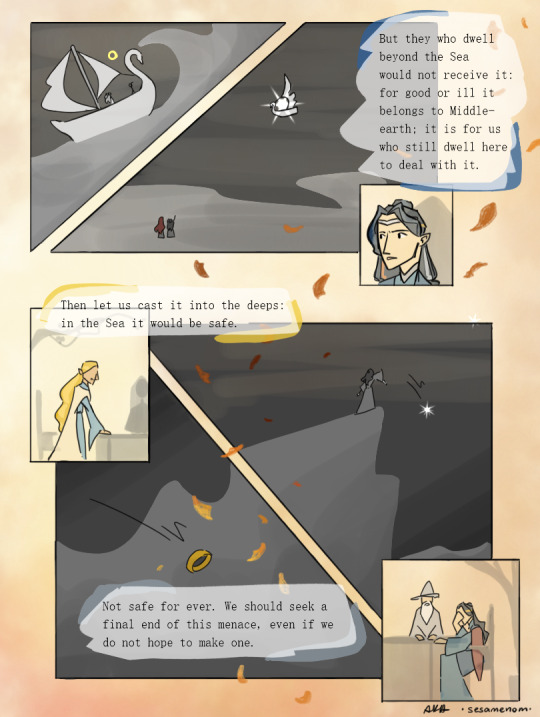
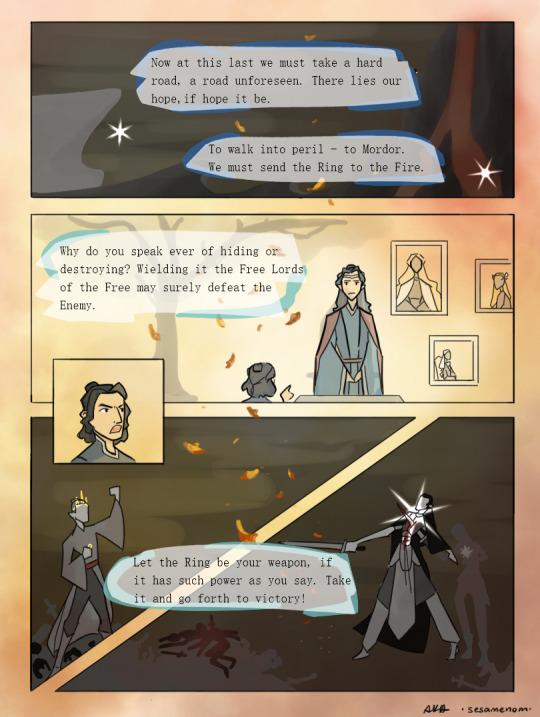
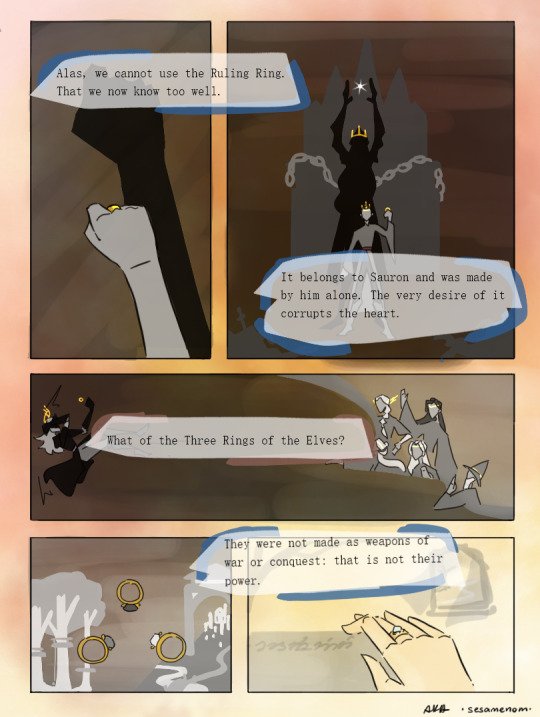
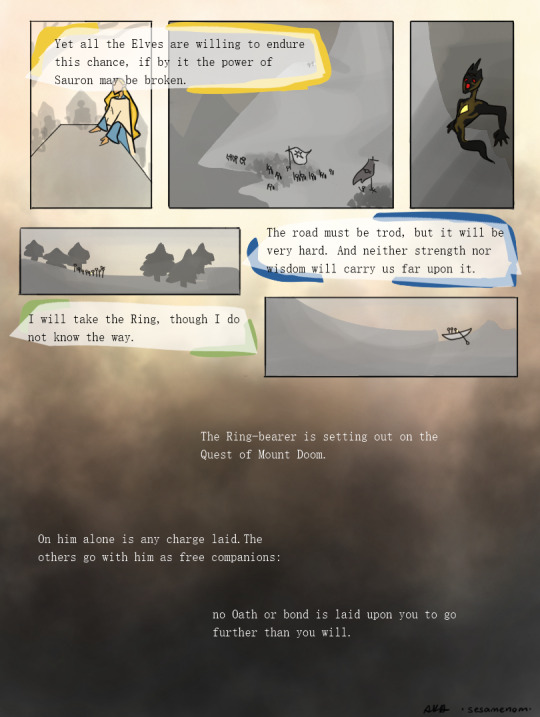

the "what-to-do-about-the-ring" chapters, but from the perspective of elronds oath-related trauma
all text from Fellowship of the Ring (council of elrond + the ring goes south), except the snippets of the Oath, which i believe is from the Shibboleth of Feanor
inspired by this post
#silm#silmarillion#lotr#lord of the rings#fellowship#lotr fellowship#comics#elrond#glorfindel#gandalf#boromir#gimli#ill tag everyone with a speaking role i guess#the only thing here i own is the art#hopefully its clear when the person talking switches based on the speech bubble colors#hm im not super happy with some pages but i think the last two turned out really well#btw the greyscale panels are past/future/hypothetical while the color panels are present#so while i was figuring out how to trim a full chapter and then some into a six page comic i realized i cut out the entirety of aragorn#which i guess makes sense since hes obviously more aware of elrond's no oaths policy?#but kind of funny#also i cut saruman to focus on the four parallels theme#fun symbolic details:#i used that one shade of dark red to represent the Oath#in the first panel elrond and erestor (the feanorian kids (i hc erestor is caranthirs son)) are the only ones wearing red#but its also not either of their main colors bc they grew up w the oath but were never actually bound by it#the leaves are redder across the elwing half panel too#on the second page it shows up again in mae's hair and across the silmaril-related half panels#on the third page its in mae's lava; the bodies in menegroth; diors blood; and the figure stabbing him#but also in the belt of the hypothetical ringlord-elrond in a darker shade than it does in normal-elrond#and a ton in the last panel - all the feanorions are either wearing red or have red hair
420 notes
·
View notes